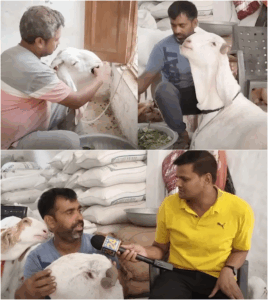The ₹10 Lakh Goats of Bulandshahr: A Tale of Luxury, Devotion, and Sacrifice
In the heart of Bulandshahr, Uttar Pradesh, two goats have captured the attention of an entire community and beyond. These are no ordinary goats; they are worth a staggering ₹10 lakh (₹5 lakh each) and live a life of luxury that rivals even the most pampered pets. As Eid al-Adha approaches, the story of these goats, their extraordinary lifestyle, and their significance as sacrificial animals has become a topic of fascination, leaving many in awe.
.
.
.

A PRICE TAG THAT SHOCKED EVERYONE
The two goats, owned by Shakil Ahmed, are a pair of prized Mehwati breed animals, known for their size, strength, and quality. What sets them apart is not just their hefty price tag but also the meticulous care and attention they receive. Each goat weighs an astonishing 180 kilograms (nearly 400 pounds), making them some of the heaviest in the region. Their sheer size and health make them highly sought after, with offers exceeding ₹10 lakh already pouring in from potential buyers. However, Shakil has refused to sell them, stating that these goats are reserved for sacrifice during Eid al-Adha, a sacred Islamic tradition.
A LIFE OF LUXURY
These goats live a life that most animals — and even humans — can only dream of. They are kept in a cool, air-conditioned environment to protect them from the scorching summer heat. If the power goes out, a generator ensures that the goats remain comfortable at all times. Shakil explains that their well-being is his top priority, as they are not just animals but cherished members of his household.
Their diet is equally extravagant. Each goat consumes a carefully curated menu that includes:
2 kilograms of chickpeas every morning.
2.5 kilograms of milk mixed with almond paste and special feed.
Sheer khurma (a sweet dish made with milk and vermicelli).
Apple jam and raisins to keep them cool during the summer.
5 kilograms of fresh leaves, along with cucumbers and tomatoes, which are purchased daily regardless of market prices.
Their meals are designed to maintain their health, enhance their weight, and ensure they are in prime condition for the upcoming sacrifice. Shakil proudly states, “I treat them like my own children. Their care and diet are more important than anything else.”
DEVOTION AND SACRIFICE
The significance of these goats goes beyond their price and lifestyle. They are being raised for the sacred ritual of Qurbani (sacrifice) during Eid al-Adha, an Islamic festival that commemorates the willingness of Prophet Ibrahim (Abraham) to sacrifice his son in obedience to God. In modern practice, Muslims sacrifice animals like goats, sheep, or cows as an act of devotion, with the meat distributed to the poor and needy.
For Shakil, the sacrifice of these goats is a deeply spiritual act. He believes that offering the best to God is a way to express gratitude and seek blessings. “These goats are not just animals; they are a means to earn God’s favor. Their sacrifice is a way to show our devotion and faith,” he says.
THE STORY BEHIND THE GOATS
Shakil has been raising these goats since they were born, and their journey from ordinary kids to prized animals is a testament to his dedication. He explains that the Mehwati breed is known for its exceptional quality, but achieving their current size and health required immense effort. Over the past two years, Shakil has spared no expense to ensure that the goats receive the best care possible.
Their grooming is also a daily ritual. The goats are bathed regularly, their coats brushed to maintain their shine, and their hooves checked for any signs of injury or infection. Shakil employs a dedicated caretaker who ensures that the goats are always comfortable and healthy.
A COMMUNITY IN AWE
The story of these goats has spread like wildfire, drawing curious visitors from neighboring areas. People come to see the goats, take pictures, and marvel at their size and lifestyle. Many are astonished by the effort and resources that have gone into raising them. “I have never seen anything like this in my life,” says one visitor. “These goats are like royalty!”
The attention has also brought offers from buyers, with some willing to pay over ₹10 lakh for the pair. However, Shakil remains firm in his decision to sacrifice them during Eid. “No amount of money can change my mind. These goats are meant for Qurbani, and that is their purpose,” he says.
THE MESSAGE BEHIND THE SACRIFICE
While the story of these goats may seem extravagant, it carries a deeper message about faith, devotion, and community. The act of Qurbani is not just about the sacrifice itself but also about sharing and giving to those in need. The meat from the sacrificed animals is distributed among family, friends, and the less fortunate, ensuring that everyone can partake in the joy of Eid.
Shakil hopes that the story of his goats will inspire others to understand the true meaning of Qurbani. “It’s not about the price or the size of the animal; it’s about the intention behind the sacrifice. It’s about giving your best to God and helping those in need,” he explains.
Play video:
CONCLUSION: A STORY OF FAITH AND DEDICATION
The tale of the ₹10 lakh goats of Bulandshahr is more than just a story of luxury and extravagance. It is a reflection of the lengths people are willing to go to honor their faith and traditions. Shakil’s devotion to raising these goats with such care and love is a testament to his deep-rooted beliefs and commitment to his religion.
As Eid al-Adha approaches, these goats will fulfill their purpose, becoming a symbol of sacrifice, devotion, and community. Their story serves as a reminder of the values that lie at the heart of this sacred festival — faith, generosity, and the spirit of giving.
News
Missing PG Student Monica from Darbhanga CM College Found in Shocking Condition—Police Stunned
Missing Darbhanga CM College Student Monica Found Safe—Reveals She Left Home Willingly to Marry A week-long mystery surrounding the disappearance…
Chaos on the Kanwar Yatra: Devotees Go on Rampage, Vandalize Dhaba from Muzaffarnagar to Roorkee!
Kanwar Yatra Turns Violent: Kanwariyas Vandalize Dhabas from Muzaffarnagar to Roorkee Over Onion in Food A shocking wave of violence…
Uproar After Samajwadi Party Leader Sunil Yadav’s Death: Ex-MLA and Brother-in-Law Named in FIR!
Uproar in Sultanpur After Samajwadi Party Leader Sunil Yadav’s Mysterious Death: Former MLA and Brother-in-Law Named in FIR A wave…
Shocking Viral Video: Teacher Beats Student with Stick in Bihar School—Discipline or Violence?
Bihar School Turns Battleground: Viral Video Shows Teacher Beaten Brutally by Angry Parents—Discipline or Violence? A shocking video has taken…
Forced to Strip at Knifepoint: Obscenity in the Name of Jobs—What’s Happening in Uttar Pradesh?
Job Promise Turns Nightmare: Woman Forced to Undress at Knifepoint in Uttar Pradesh Official’s Quarters Uttar Pradesh: A shocking video…
UP Education Minister Injured in Road Accident as Convoy Cars Collide
UP Education Minister Gulab Devi Injured in Road Accident as Convoy Cars Collide Hapur, Uttar Pradesh: Uttar Pradesh’s Education Minister,…
End of content
No more pages to load












